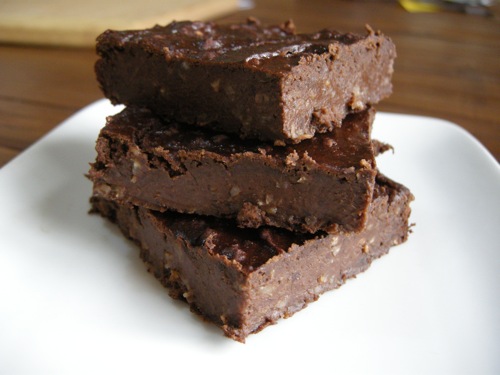Before I get to the blog post — last minute news! Rumor has it I'm going to be on Dr. Oz this afternoon, so tune in and see me cook my portobello steaks!
Now, on to today's business...
I'm always getting a ton of questions about freezing foods and freezing recipes so here are a few tips, but first a confession:
I don't really freeze anything (outside of ice and veggies/fruits that come frozen). One reason is I never got into the habit of freezing foods because I've never had much freezer space to work with. My tiny NYC kitchen barely had room for a mini fridge, and I didn't have a lot of access to frozen items in St. Maarten either. Since everything had to be flown to the island, frozen items were limited and often very expensive. So no habit formed.
I also don't own a microwave and I find a freezer and a microwave go together like peas and carrots. This also brings me to my next point (another reason): Frozen foods also take so much longer to heat up then foods that were just chillin' in the fridge and I have no patience when I'm hungry. (These are just a few of the many reasons why I opt to store things in my fridge rather than freeze them).
Lastly, freezing also changes the texture of a lot of foods and I'm very sensitive about textures (many food textures turn me off), so that scares me away from freezing, too... still, I know a lot of people are freezer fanatics or want to freeze big batches of foods — so here are a few tips and/or warnings.
Fruits: Any fruit with a high water content, like watermelon or citrus fruits, generally doesn't freeze, but their juice should. Tomatoes are fine if they are in something, but not whole. Berries rock the freezer.
Vegetables: Like fruits, avoid freezing vegetables with high water content. For example, cabbage, celery, cucumbers, endive, lettuce, radishes, mushrooms, and potatoes end up limp and soggy if you freeze them. The one exception is soup. If you have a little bit of celery, mushroom, or potato in a soup, then it'll be okay — but you don't want to freeze these items whole or any recipe where they are a key component.
Pasta: With the exception of lasagna, I've never had luck with pasta that's reheated after it's frozen (I tried many times and failed in college). It always turned mushy on me.
Tofu: While tofu does freeze, the texture changes substantially. Sometimes this is good, but in terms of leftovers, this texture change is rarely the desired result. For more information, see my "how to freeze tofu" post.
Nondairy Milk (i.e., almond milk): It separates and gets gnarly — don't try freezing it. Similarly, you don't want to freeze anything that's mostly nondairy milk-based.
Mayo/Salad Dressing: Separates — don't freeze.
Sauces/Gravies: Tomato-based sauces like marinara sauce do pretty well but other sauces and gravies, especially those that are creamy, tend to separate or get soggy and weird during reheating.
Fried or Baked Foods: They become limp and lose crispness.
Bananas: They freeze beautifully, BUT you generally cannot use a thawed frozen banana in a recipe calling for fresh bananas. This is especially true for my black bean brownies.
Spices: A lot of spices and extracts don't freeze — they either lose their potency, get an "off" taste, or become bitter.
Nuts, Seeds & Flours: Nuts, seeds, and flours (i.e., whole-wheat flour) love the freezer — it's their preferable storage. This is especially true for flax seeds, which can become rancid easily.
Do you have any freezing tips?















